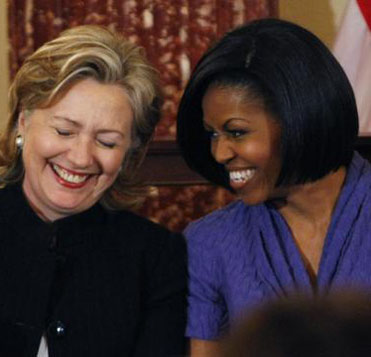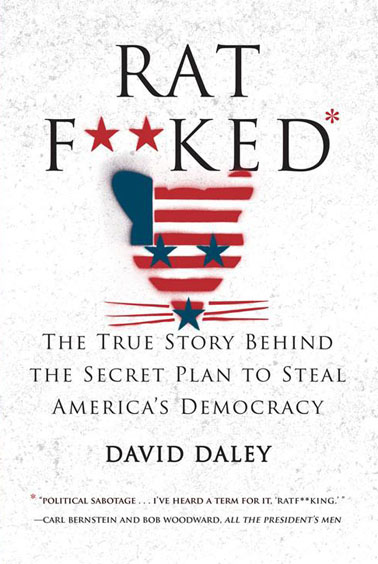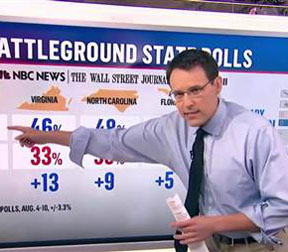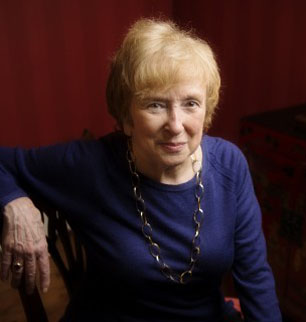Do Hillary’s current poll numbers mean she’ll win ? Remember : NDP leading in Canada on August 27, 2015!
Aug 14th, 2016 | By Randall White | Category: In Brief
This past Friday night the excellent Steve Kornacki at MSNBC TV (sitting in for Rachel Maddow) presented some intriguing 2016 US election statistics. They showed that in the more recent past presidential candidates with as good polling numbers as Hillary Clinton has now, two weeks after the last national convention, have gone on to win the election.
One problem with this calculation in 2016 is that you have to go back to 1960 to find a last convention held as early as this year. (I think : see the two Wikipedia articles, “List of Democratic National Conventions” and “List of Republican National Conventions” – which I have just looked at very quickly!) In 2016 even two weeks after the second convention we are still 12 weeks and change away from election day.
For what this could mean just think back to our own Canadian election last October 19, 2015. On August 27, 2015 the Toronto Star was telling us that : “NDP in reach of majority, new poll suggests … A new poll puts the NDP with 40 per cent support, with the Liberals ahead of the Conservatives in second place with 30 per cent. The Tories have 23 per cent support.”
 In the end, when it counted on October 19 Justin Trudeau’s Liberals took 39.5% of the cross-Canada popular vote. The Harper Conservatives took 31.9% , and the Mulcair New Democrats 19.7%! There would be a cautionary tale here for US Democrats today, if Canadian evidence were not so seldom taken seriously in the USA, for a host of tedious good reasons.
In the end, when it counted on October 19 Justin Trudeau’s Liberals took 39.5% of the cross-Canada popular vote. The Harper Conservatives took 31.9% , and the Mulcair New Democrats 19.7%! There would be a cautionary tale here for US Democrats today, if Canadian evidence were not so seldom taken seriously in the USA, for a host of tedious good reasons.
There are also current signs that Donald Trump himself is at least briefly starting to wonder just how well he might actually do on election day. See, eg, the Associated Press report :“’We’re having a problem’: Trump acknowledges he could lose to Clinton.”
At the same time, Mr. Trump has also now told one of his adoring crowds in rural Pennsylvania that the only way he can lose the 2016 election is if the Clinton Democrats cheat – by instructing their supporters, eg, to literally “vote early and often” (as the old joke has it).

Steve Kornacki and some fellow MSNBC and NBC political reporters – all progressively cuter and hotter than on Fox News!
My own 100% opinion right now is that those of us clearly in the Hillary camp shouldn’t get too cocky. There are still 12 weeks and change to go. The wisest prophecy at this juncture in my mind is still what a palpably progressive lady from Chicago on a cruise ship of my acquaintance recently predicted : “Anything can happen.”
(Meanwhile, two articles from the August 18, 2015 issue of the New York Review of Books show how even if Hillary does win handily on November 8 some very big and intractable problems will of course remain.)
1. Robert Gordon on The Rise and Fall of American Growth
The first NYRB article is William Nordhaus’s review of  Robert Gordon’s The Rise and Fall of American Growth: The US Standard of Living Since the Civil War. You can also see Professor Gordon in person on the PBS Newshour site, in “Are the best days of the US economy over?”
Whatever else, if Robert Gordon is right the USA today (and no doubt we up here in Canada, and many other places in the so-called Western World) will never again be returning to the historically unique age of economic development from 1870 to 1970 (with a few down times in the 1930s and so forth?) – regardless of who wins the 2016 US presidential election.
2. David Daley on the Republican Redistricting Majority Project in the House
 The second provocative NYRB article (in an especially intriguing summer issue generally) is Elizabeth Drew’s review of David Daley’s Ratf**ked: The True Story Behind the Secret Plan to Steal America’s Democracy.
The second provocative NYRB article (in an especially intriguing summer issue generally) is Elizabeth Drew’s review of David Daley’s Ratf**ked: The True Story Behind the Secret Plan to Steal America’s Democracy.
Daley tells how the Republican right has recently raised the ancient dark arts and crafts of gerrymandering to new heights, “with an unprecedentedly high-powered national project called REDMAP, or Redistricting Majority Project.”
As Ms Drew explains : “So successful was the Republican-dominated redistricting after 2010 that, in 2012, while the Democrats won 1.5 million more votes for Congress than the Republicans did, they gained only eight seats, hardly a change at all. Thus the Republicans, sheltered by the previous redistricting, held a thirty-three-vote advantage in the House despite the fact that they’d been decisively outvoted.”
Again, even if Hillary Clinton does finally win the presidential race handily in 2016, Ms Drew confirms the general current suspicion that (as she writes) “barring an overwhelming landslide this year” for Democrats everywhere, Republicans will retain control of the House of Representatives in 2016. (And continue to effectively frustrate any Clinton presidential agenda, just as they have with President Obama’s agenda since 2012.)
One of the strange-to-a-Canadian features of American politics is that state governments determine federal Congressional districts (after each federal population census). And this can be a process especially open to redistricting for partisan political advantage when it is undertaken by state legislatures.
As Elizabeth Drew rightly points out, the quite straightforward cure for this anti-democratic conspiracy in contemporary American politics is to take redistricting to account for population changes out of the hands of elected politicians, and put it into the hands of independent or bipartisan redistricting commissions. This is broadly similar to what we already do in Canada (at both federal and provincial levels) – and what is already done in seven states of the union : Arizona, California, Hawaii, Idaho, Montana, New Jersey, and Washington.
The last few sentences of Elizabeth Drew’s review of David Daley’s book read : “Citizen action of the kind that would push for redistricting commissions can be quite effective once the public is armed with the facts and determined to push for change. The information is at hand; what’s needed now is the will in numerous states to force the powers that be to make this most fundamental and consequential reform of our political system.”

Hillary on The Breakfast Club at NY radio station Power 105.1, back in April. Photo credit: CTHAGOD — The Breakfast Club.
Whatever else, all this finally brings home the extent to which even if Hillary does win handily on November 8, real progressive change will continue to depend in no small measure on the kind of continuing post-election organizing activity outside Washington, DC that Bernie Sanders has talked about. Or, as President Obama has also urged recently, if Sanders supporters and others really want to keep fighting growing inequality in the economy and much else, they (among other things) also have to start getting involved in state politics, where federal Congressional districts are still defined by partisan state legislatures in the great majority of states of the union. And personally I hope Elizabeth Drew is right about the capacity of “citizen action” outside the more established political process to finally get this urgent job done.





None of this is to say that the email story isn’t taking a toll on her image. Polls show majorities see her handling of her emails as problematic, and the story probably does feed into a longtime vulnerability of hers — questions about her honesty. But the point is that a drop in her numbers was probably inevitable. Even if the email story is in fact exacerbating her current troubles, it is probably just feeding into a dynamic that might have been there anyway.